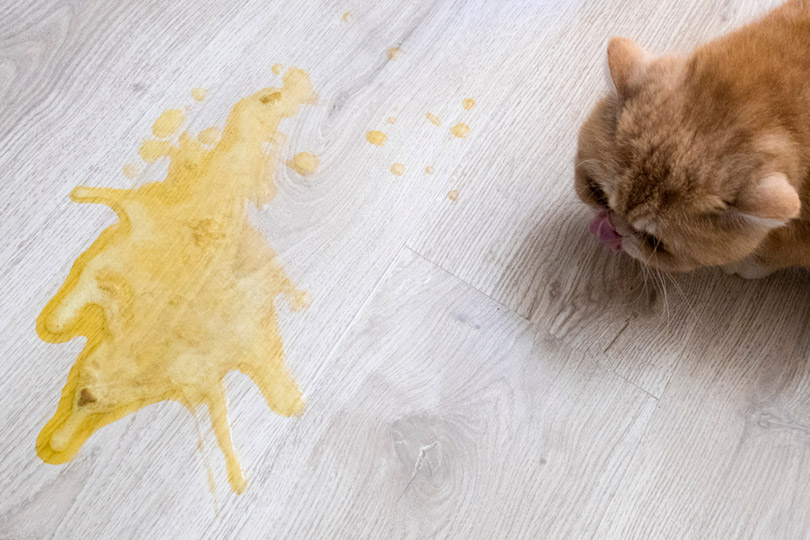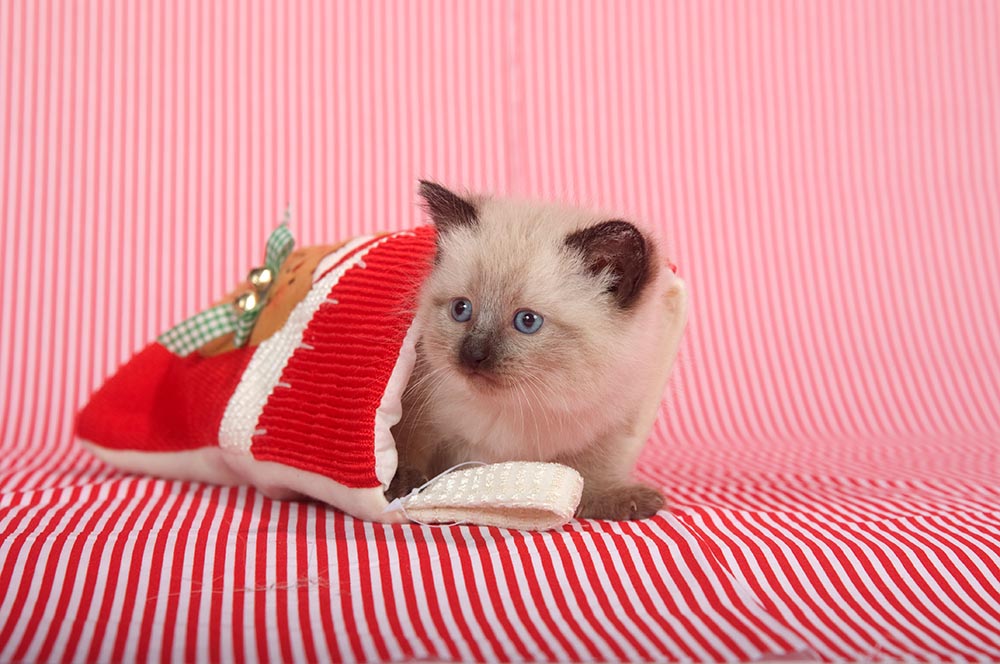Why Does My Cat Hug My Arm Then Bite Me? 6 Possible Reasons
Updated on

Has your cat ever snuggled up to your arm, giving it a tight, furry hug, only to suddenly nip you? If this is a common occurrence, you might be left bewildered, and perhaps even a little hurt. Cats, though notorious for their enigmatic behavior, always have a reason behind their actions. To get to the bottom of this particular behavior, we’ll explore some common reasons why your cat might hug your arm and then bite you, as well as tips for preventing this behavior if it’s becoming a problem.
 The 6 Possible Reasons Why Your Cat Hugs Your Arm Then Bites You
The 6 Possible Reasons Why Your Cat Hugs Your Arm Then Bites You
1. Overstimulation: The Cat’s Tactile Dilemma
Cats are known for their love of tactile interactions, but these sensitive creatures can quickly become overstimulated, especially if they are touched in an overly sensitive area or for a prolonged period. What begins as a soothing petting session can become too much for them, and their response may involve grabbing your arm and biting it as a way to signal you to stop.
It’s essential to pay attention to your cat’s cues. If you notice signs of agitation such as tail lashing, twitching skin, or flattened ears, it might be time to give your feline friend some space. Overstimulation can trigger a fight or flight response in your cat, leading to that unexpected bite. The best way to handle this is to gently disengage and let your cat calm down.
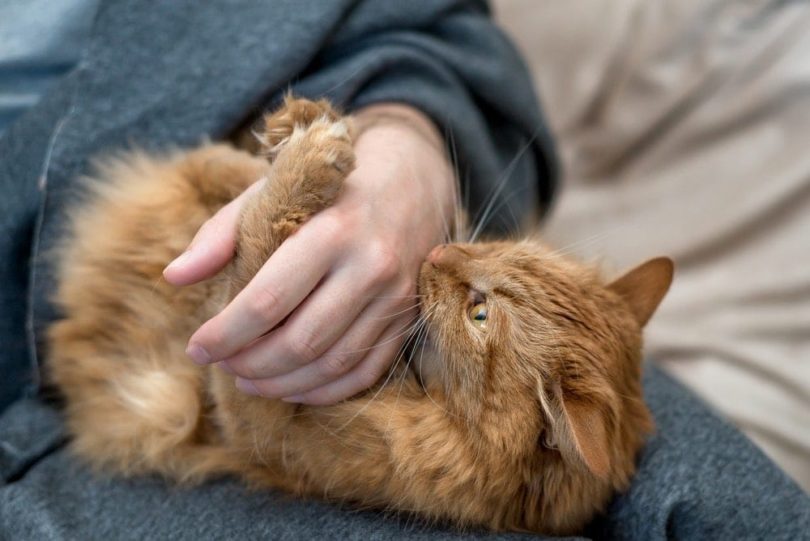
2. Cats at Play: Rough but Not Malicious
Have you ever watched your cat interact with its feline peers? You might notice some rough-and-tumble play, complete with grabs, bites, and seemingly aggressive behavior. This is just how cats play, and it’s a vital part of their social interaction. If your cat grabs your arm and bites it, they may simply be engaging you in this playful behavior.
Although this behavior is normal among feline friends, it’s not exactly pleasant for humans on the receiving end, especially considering the potential risk of injury from a deep cat bite. One way to handle this is by discouraging your cat from initiating this behavior. If your cat starts to get too rough, stop the interaction and give them a toy to play with instead. This redirection can help your cat understand the boundaries of playtime with their human companion.
3. The Teething Trials: Growing Up Feline
If your arm-biting friend is a kitten, there’s a chance they might be teething. Similar to human babies, kittens experience discomfort as their teeth grow in and might resort to biting to alleviate the pain. During this time, it’s normal for kittens to bite you and other objects in their environment.
However, it’s crucial to guide your kitten towards more appropriate teething aids to prevent this behavior from continuing into adulthood. Consider investing in teething toys specifically designed for kittens. These can provide an outlet for their chewing needs without risking your arm.
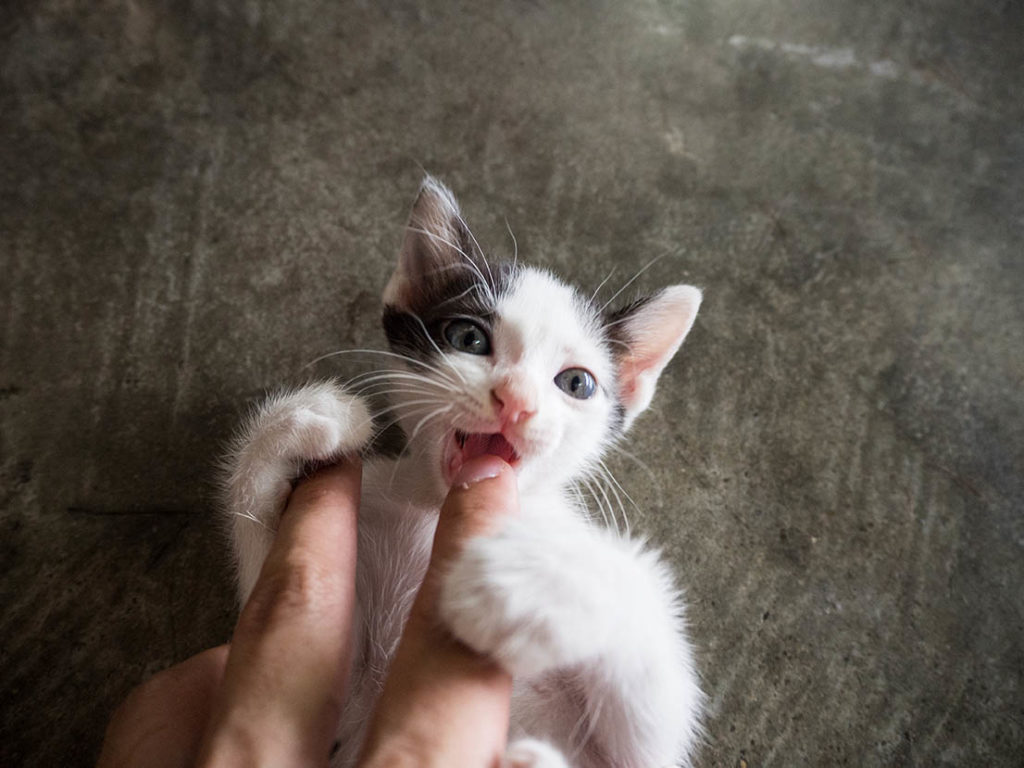
4. The Hunter’s Instinct: Stalk, Pounce, Bite
Beneath their domesticated demeanor, cats are instinctual hunters. Their prey drive can be triggered by various stimuli, from the fluttering of a curtain to the unsuspecting movement of your arm. If your cat suddenly latches onto your arm and bites it, they may be acting on this innate predatory instinct.
While you certainly don’t want your arm to become your cat’s favorite “prey,” you can channel their hunting instincts constructively. Interactive toys that mimic the movements of prey, such as laser pointers or feather wands, can provide an appropriate outlet for your cat’s hunting behavior.
5. The Unseen Aggressor: Dealing With Redirected Aggression
Sometimes, the arm biting may not be directed at you personally. Instead, it’s possible that your cat is dealing with frustration, stress, or anger triggered by something else in their environment. This phenomenon is known as redirected aggression. Your cat might be reacting to a neighborhood cat seen through the window or a loud noise that startled them.
Understanding the root cause of such aggression is vital in dealing with it. If you identify a consistent trigger, you can take steps to remove or minimize its impact on your cat. Consulting a professional may also be beneficial in managing this behavior.
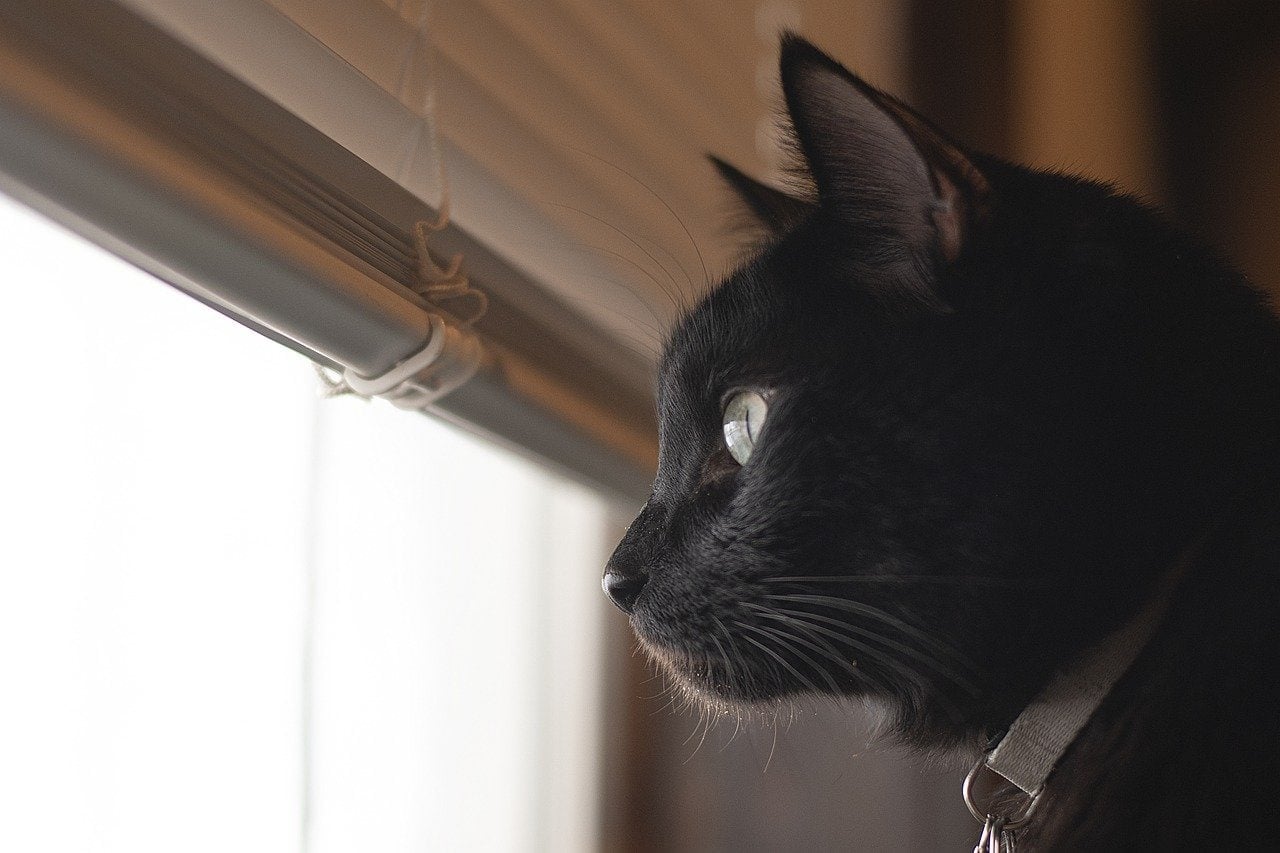
6. The Love Bite: Feline Affection or Misguided Munching?
In some cases, your cat might be expressing their affection, especially if they’re only lightly nibbling on your arm. Mother cats often give their kittens gentle bites as a sign of affection, and kittens reciprocate this behavior as they get older.
Even though it might be a friendly gesture, it’s still important to discourage this behavior if it’s becoming uncomfortable for you. Firmly but gently saying “no” and removing your hand can signal to your cat that this behavior isn’t acceptable.
How to Prevent Your Cat from Biting Your Arm: Top Tips
Understanding why your cat is biting your arm is the first step to addressing the behavior. However, it’s also important to have strategies to prevent this behavior from becoming a habit. Here are a few helpful tips:
- Avoid harsh corrections: Cats do not respond well to yelling or physical punishment. Instead, calmly and firmly discourage the behavior.
- Move your arm away: If you notice that your cat seems interested in your arm, move it out of their reach before they have a chance to bite.
- Use toys to distract: Engage your cat’s attention with a variety of toys. This can divert them from your arm and provide a healthy outlet for their energy.
- Increase playtime: More interaction with your cat through play can reduce biting behavior by keeping them mentally stimulated and physically exhausted.
- Start early: If you have a kitten, it’s crucial to discourage biting behavior early on. Establishing these boundaries early can prevent the behavior from becoming an issue later.
- Seek professional help: If the biting continues or seems to be associated with aggression, a visit to the vet or a consultation with a veterinary behaviorist can help. They can assess your cat’s behavior and offer strategies to manage it effectively.
Conclusion
Unraveling the mystery of why your cat hugs your arm and then bites you is a journey through the varied and sometimes complex aspects of feline behavior. From overstimulation to playful roughhousing, teething woes to hunting instincts, redirected aggression to affectionate nips, each reason paints a vivid picture of the world from a cat’s perspective.
Above all, understanding and responding appropriately to these behaviors fosters a deeper bond between you and your feline companion. Navigating these nuances may pose its challenges, but with patience, compassion, and a healthy dose of curiosity, we can create a harmonious and respectful environment for our furry friends.
Remember, their actions are simply expressions of their innate instincts, needs, and affection for you. By recognizing and addressing these, we ensure their well-being while enriching our shared experiences with these wonderfully enigmatic creatures.
Featured Image Credit: KirbyStudios, Shutterstock
 The 6 Possible Reasons Why Your Cat Hugs Your Arm Then Bites You
The 6 Possible Reasons Why Your Cat Hugs Your Arm Then Bites You


